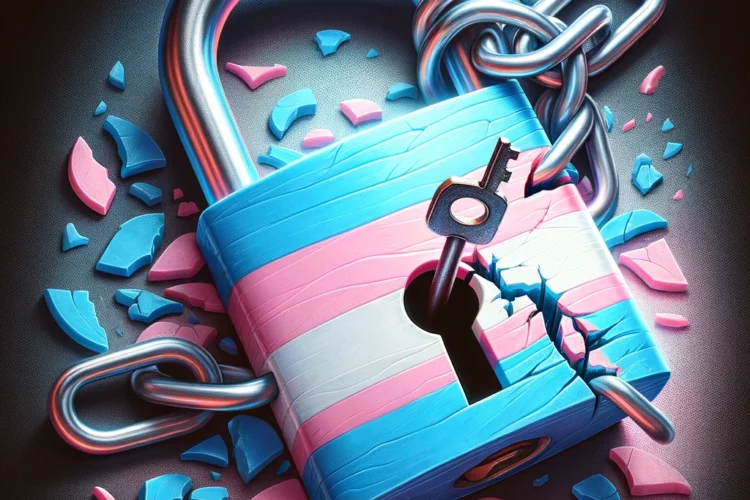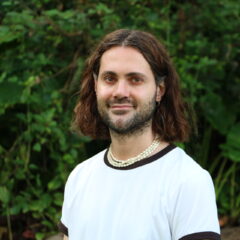Summary: Activist strategies that critically analyze transphobia and white cis-hetero-patriarchy and how these are reproduced, with a focus on transforming these institutions, have a greater potential to bring about desired systemic and sustainable change than enacting hate crime legislation. Trans liberation, as a goal, does not lie in targeting individuals with transphobic attitudes, but rather in holding States accountable for upholding institutionalized transphobia and demanding systemic change. Individuals who express transphobic views and behaviors have internalized existing attitudes produced by power embedded in institutions. We need to redirect our attention to the State as the main source of transphobia and demand institutional change.
Around the world, trans and wider LGBTQI activism are frequently invested in legislative changes that aim at eliminating hate-motivated crimes and acts of discrimination (also known as carceral activism), as these are some of the most pressing problems our communities face in our everyday lives. It is assumed that criminalizing and or toughening existing punishments for these acts will serve as a deterrence for transphobia and will enable trans and gender diverse communities to live in less violent environments. While this strategy may have some positive impacts, I do not believe that it should be our only action. In this opinion piece, I want to discuss the limitations of this strategy and invite activists to broaden our approach to demand a more systematic solution.
To understand how these strategies have become such a dominant goal for activism, we need to look at the theoretical legacy from which these strategies have primarily emerged. Stemming from Christian theology, for centuries – particularly in Western political thought – we have become used to thinking of human beings as autonomous individuals, of having free will, and therefore, of having ultimate responsibility over their actions. Recent developments in sociology, psychology, and philosophy are questioning this premise and exploring how the environment (political and economic context, language, culture, traditions, customs, household settings and relationships, socioeconomic status, education, and everything else) play a role in shaping who we will become. These environments create experiences that shape us, and it is not a finite process. We are constantly being reshaped into becoming a different version of ourselves because our experience of the world is ongoing. This is not to say that individuality does not exist. Every human being is born with different characteristics (color of skin, sex, socio-economic status, geographical location, ability, etc.), and based on these characteristics, our environments affect each of us differently, thus creating unique sets of experiences that shape our individual personalities. However, we must acknowledge that we don’t have much power and control over what experiences we will have, and there are dominant and less dominant forces in operation.
Looking at societies from this theoretical lens, we can conclude that people are not born with inherent transphobia, homophobia, sexism, racism, or any other attitude. As we are raised in white cist-hetero-patriarchal societies, we internalize (or resist) these dominant views. Such analysis invites us to shift the burden of responsibility from individual attitudes to wider systems that produce those attitudes. These systems operate through education, media, religion, police, legislative bodies, and other institutions, thus it is the State that has the greatest amount of power and, therefore, the responsibility to change these systems. However, this does not remove accountability from the individual perpetrators of hate-motivated crimes, nor should it remove the individual punishment for those crimes. Simply put, if we aim to address inequalities at a systematic level, our activism needs to be directed at systematic solutions.

Recently, in academia, scholars have focused their lens on queer movements and their investments in punitive policies, in particular on hate crimes. Sarah Lamble (2013), argued that hate crime has become a tool for LGBTQI individuals to claim citizenship: their incorporation in the citizenship body is marked by the States’ willingness to acknowledge their oppression and to punish the ‘failed’ and ‘unworthy’ citizens. This creates the dichotomy of good vs failed citizens and diverts criticism from the State, as the main source of hate crimes, to individuals. Lamble claims that such politics are unable to comprehend homophobia (or any other hate crime) as a systematic problem and instead see the problem as originating within the individual perpetrators. In this scenario, the State becomes not the main target of criticism but the protector, the arbiter. Lamble argues that incarcerating hate crime offenders has not proven to be effective, mostly because the prison systems themselves are institutions where violent heterosexual masculine norms are reproduced.
Ely Aharonson (2010) makes a similar claim based on her exploration of the proliferation of pro-minority criminal legislation. She claims that such criminalization allows the State to escape the responsibility of working on structural inequalities that result in individual hate crime acts, and instead allows them to divert attention to individuals, thereby framing itself as an ally to minority groups:
“In this context, the increasing alacrity of legislatures to reassert the commitment of the state to eliminating insecurities caused by bigotry-motivated offenders resonates with what Zygmunt Bauman described as a “transfer of anxiety,” in which the retreat of governments from regulating the large-scale systems of harm production built into contemporary modes of capitalist production has increased the amount of political capital invested in crime policymaking. For Bauman, this process stems from the functionality of law and order politics as a “highly dramatic, tangible and visible” symbol of governmental competence. These symbolic qualities render criminalization an effective tool for reinforcing public trust in the power of government to maintain order and security in an era in which the actual regulatory capacities of governments have been eroded significantly.” (p. 301)

Moreover, if we look at the demographics of who usually gets punished for hate-motivated crimes, it is mostly individuals from ethnic and racial minorities, with low socioeconomic status, and lack of access to education, healthcare, and decent wages, vulnerable groups that are already overpoliced and excessively punished. Therefore, carceral activism may be further contributing to the maintenance of the oppressive system towards vulnerable groups.
As an effective alternative, I propose to focus our strategies on identifying the problematic systems or problems within the systems that produce transphobia and cis-normativity and transforming those problematic areas. For this, I would argue that focusing our strategies on the transformation of education, healthcare, social security and welfare, economy (fair taxation and just economic redistribution), and other relevant systems could have much more effective and far-reaching impacts for trans liberation than simply punishing individual cases of violent abuse. While transforming these systems may be a far more complicated and slower process, focusing on enacting specific legislation is a much more specific goal, and usually much more easily communicable to donors in order to receive funding (especially as donors usually prefer to support specific and time-limited initiatives, which removes incentive and resources from activists to focus on the larger picture and engage in long-term work), it has the potential to bring about more sustainable systemic change.
In my next article, I will examine possible routes to implementing such activism by exploring specific examples.






